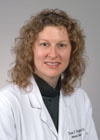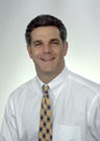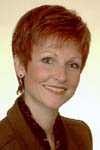HSF to honor faculty members with awards
Three faculty members will receive the 2004 Health Sciences Foundation Teaching Excellence Awards during Fall Convocation on Aug. 24.They are being announced now for the benefit of faculty and students who nominated 23 candidates for the three categories of awards. Chosen from those nominees are Tamara Wolfman, M.D., Stephen Vermillion, M.D., and Lisa Saladin, Ph.D.
Tamara Wolfman
Tamara Wolfman, M.D., will receive the Educator-Mentor Award for excellence
in mentoring and role modeling.
 Dr.
Tamara Wolfman
Dr.
Tamara Wolfman
An assistant professor in the Department of Medicine, Wolfman teaches both undergraduate and graduate students. She is a course instructor in clinical medicine and an attending in both the medical ward and ambulatory clinic. She also serves as the associate program director of MUSC’s Internal Medicine Residency Program.
Since receiving her faculty appointment at MUSC in 1999, Wolfman has made a significant impact on the education of many students. Each year, she instructs and mentors second- and third-year medical students, physician’s assistant students, and internal medicine residents. In every case, the response from those who received her instruction has been outstanding.
“Dr. Wolfman was incredible,” wrote one second-year medical student. “Her enthusiasm and concern for our group was evident, and she often went above and beyond what was expected of her role. I can’t say enough to give her the credit she deserves.”
Other students called Wolfman “perhaps the greatest instructor I’ve had,” “the best faculty member I have come into contact with on any rotation,” and “the best instructor I’ve had since starting medical school.”
Edward O’Bryan, a student for whom Wolfman served as an academic advisor, hailed Wolfman’s role as a mentor. “There is a big difference between an advisor and a mentor,” he wrote. “Although both share the characteristic of sound teaching and advice, only the mentor goes a step farther and shares his or her life with the student. Dr. Wolfman has done this, and has earned my unwavering support.”
Support for Wolfman comes not only from her students but also from her peers.
“Tamy and I have collaborated on a number of educational projects, and she consistently impresses me with her skills,” wrote E. Benjamin Clyburn, M.D., assistant professor of medicine and director of the Internal Medicine Residency Program. “She has taught me a great deal since I’ve been working with her. I can think of no one more dedicated to medical education.”
Jean Robey, M.D., Department of Medicine, also spoke glowingly of her colleague.
“The true value of having Dr. Wolfman as one of our professors would not be appreciated without mentioning her strong representation of women in this field,” Robey wrote. “She exhibits personal balance and professional success that is unapologetic and still detailed and compassionate. She excels not in spite of being a woman, but because she is a tenacious person. Strong women like Dr. Wolfman still pave the way for women to come.”
When asked to explain her educational philosophy—one that has garnered such adamant support—Wolfman searched for the right words.
“How does one paraphrase a passionate calling?” she wondered. “Learning is a team effort. I strive to foster an environment where hierarchical boundaries are disregarded in favor of peer relationships. My goal is for learners to feel nurtured and to feel encouraged to actively participate in decision making with my guidance and support.
“I endeavor to earn their trust and respect while building self-confidence through positive reinforcement and constructive feedback. Likewise, I actively seek feedback for my performance so that I may continue to improve my teaching skills. In the end, teaching others teaches me.”
Stephen Vermillion
Stephen T. Vermillion, M.D., will receive the Developing Teacher Award
for teaching excellence by a junior faculty member with fewer than four
years of teaching experience.
 Dr.
Stephen Vermillion
Dr.
Stephen Vermillion
An assistant professor of maternal-fetal medicine in the Department of Obstetrics and Gynecology, Vermillion instructs students in both academic and clinical settings. He serves as director of the OB/GYN Resident Research Seminar Series, helping first-, second-, and third-year OB/GYN residents create, implement, and complete prospective research projects suitable for peer-review publication. He also instructs and mentors medical students and residents in various clinical settings on subjects including labor and delivery, high-risk obstetrics, and prenatal wellness.
Vermillion also received nominations on two occasions for the Golden Apple teaching award, an honor bestowed upon faculty members by their students. Residents ranked him near the top of the list of OB/GYN faculty; likewise, he received the American College of Obstetricians and Gynecologists Resident Education Award.
In their evaluations, residents called Vermillion “one of the department’s greatest assets” and “a valuable future leader in the department.” One resident called him “the perfect attending—close enough in age to relate well to the residents, yet he possesses the knowledge base and technical skills to be a great educator.”
Wayne Kelley, a student in the College of Medicine, appreciated Vermillion’s love of teaching.
“He has a natural talent for breaking down difficult topics into a format that students can understand,” Kelley wrote. “Each interaction with him offers an opportunity to learn. His charisma, talent, and day-to-day enthusiasm had a positive influence on my classmates and me alike.”
And while those who have learned from Vermillion appreciate his efforts, praise for this year’s Developing Teacher Award winner comes from many sources, including J. Peter VanDorsten, M.D., chairman of Obstetrics and Gynecology.
“I now have a 13-year association with this young man, having first met him at the Medical College of Virginia where he was a third-year medical student,” Van Dorsten wrote. “Steve has become a star in our department, in our institution, and in our specialty. His accomplish-ments are unparalleled, and I feel that he is a deserving recipient of the Developing Teaching Award.”
Roger Newman, M.D., vice-chairman of academic affairs and division director of maternal-fetal medicine, also endorsed Vermillion.
“Steve is one of our department’s finest teachers at all levels, be they students, residents, or his peers,” Newman wrote. “At the end of each third-year student rotation, the Academic Affairs Committee gives a teaching award to the faculty member and resident who receive the highest medical student teaching evaluations from the just-completed rotation. Dr. Vermillion is a frequent recipient of the award.”
Donna Johnson, M.D., director of the OB/GYN residency program, agreed. “Dr. Vermillion is a very well respected clinician and a very valuable educator at both the local and national levels,” she wrote. “His knowledge has been used to educate clinicians across the United States.”
Vermillion’s teaching philosophy adheres to a strict but basic policy of communication between teachers and pupils.
“There are never any ridiculous questions,” he wrote. “Those whom you educate need to know that you’re always approachable. Simply spoon-feeding information is not the objective. We need to engage in interactive questioning and anticipatory guidance. We need to provide a sense of security to ask “Why?” and ultimately to spark the spirit and interest of self-directed learning.
“Nurturing the hunger for knowledge of those we educate will serve as the best philosophy of all.”
Lisa Saladin
Lisa Saladin, Ph.D., will receive the Educator-Lecturer Award for excellence
in classroom teaching.
 Dr.
Lisa Saladin
Dr.
Lisa Saladin
Saladin, associate professor in MUSC’s Physical Therapy Education Program, also serves as a member of the American Physical Therapy Association—in its Neurology, Education, and Health Policy section—and of the American Stroke Association’s Stroke Council and the MUSC Neuroscience Institute.
At MUSC, she teaches numerous neurological, neuroscience, and neuromuscular courses in an academic setting. She also contributes to many continuing education presentations, professionally and within the community, and advises 12-15 students each year.
Juggling her responsibilities may not be easy, but Saladin often makes it look that way, and her students appreciate her devotion.
“I was continuously amazed at how she managed her time between students, school, patients, and her family while never missing a beat,” wrote Jenna Shive, a student in the College of Health Professions. “Despite her multiple job roles, Dr. Saladin’s number one priority is her students. She creates an open and comfortable learning environment.” She added that Saladin often adjusted her class schedules accordingly when her students felt overly stressed, such as during exams.
“Dr. Saladin is a professor, a role model, and a mentor,” Shive concluded. “I often ask, ‘What can’t she do?’ and I have yet to find an answer. She is an invaluable asset to the physical therapy program at MUSC and to the university as a whole.”
Torie Clark, another CHP student, appreciated Saladin’s easy manner of instruction.
“As a first-year physical therapy student, the idea of a neuroscience course was daunting,” Clark wrote, “Those fears quickly subsided as I began to learn under the enthusiastic guidance of Dr. Saladin. She not only has an extensive amount of knowledge, she has an amazing way of making difficult subjects fun and easy to understand.”
CHP student Tanya Barber admired Saladin’s attention to both the clinical and academic aspects of her classes’ education. “She stressed the importance of becoming competent, compassionate clinicians over just making good grades,” Barber wrote. “She really made me excited about taking what I’ve learned into the clinic and applying it with my patients. Lisa Saladin is definitely one of the best teachers I have ever had.”
Saladin’s commitment to giving more than expected to her students was not lost on Amanda Kelley. “Good professors excite their students and challenge them to seek more knowledge,” Kelley wrote. “Excellent professors do all of that, but also take the time to truly know their students. Excellent professors tailor their educational plans to their students’ needs while encouraging them academically and personally. Dr. Lisa Saladin belongs in the category of excellent professor.”
Scores of students supported Saladin’s nomination, relating stories and comments that professed their overwhelming satisfaction with their teacher’s efforts. Such success derives from a strong teaching philosophy that Saladin says rests on three fundamental principles.
“First, all students have the potential to learn challenging material; one of my roles is to help students evaluate their current learning strategies and to introduce them to effective alternatives,” Saladin wrote. “Second, a quality educator supplies students with tools, resources, and guidance—not with all of the answers. I’ve integrated clinical problems into all courses to enable students to generate and test clinical hypotheses.
“Finally, motivation is critical for effective learning. My primary strategies for motivating students are to share my passion and enthusiasm for the content that I teach and to continuously demonstrate the connection between the material they learn and their future clinical practice.”
Each of these recipients deserve our highest praise for the contributions they have made and continue to make to our educational mission. They serve as role models for all of us who are fortunate enough to spend our careers in academia. It is clear they are also role models for the scores of individuals they have motivated, enlightened, and prepared to be outstanding health professionals. We are indeed fortunate to have them among us.
The recipients will be formally recognized in August at Fall Convocation, and each will receive a cash award of $3,000 and a certificate. In honor of their accomplishments and as a continual recognition of their contributions, they will also receive a medallion to be worn with their academic regalia at all future graduations.
Valerie T. West, Ed.D.
Associate Provost for Education and Student
Life
Friday, May 14, 2004
Catalyst Online is published weekly, updated
as needed and improved from time to time by the MUSC Office of Public Relations
for the faculty, employees and students of the Medical University of South
Carolina. Catalyst Online editor, Kim Draughn, can be reached at 792-4107
or by email, catalyst@musc.edu. Editorial copy can be submitted to Catalyst
Online and to The Catalyst in print by fax, 792-6723, or by email to petersnd@musc.edu
or catalyst@musc.edu. To place an ad in The Catalyst hardcopy, call Community
Press at 849-1778.